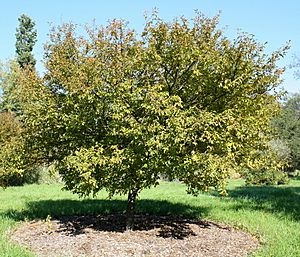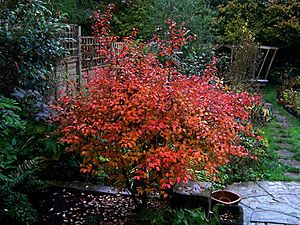Fuji cherry facts for kids
Quick facts for kids Fuji cherry |
|
|---|---|
 |
|
| Prunus incisa | |
| Conservation status | |
| Scientific classification |
|
| Kingdom: | Plantae |
| Clade: | Tracheophytes |
| Clade: | Angiosperms |
| Clade: | Eudicots |
| Clade: | Rosids |
| Order: | Rosales |
| Family: | Rosaceae |
| Genus: | Prunus |
| Subgenus: | P. subg. Cerasus |
| Species: |
P. incisa
|
| Binomial name | |
| Prunus incisa Thunb.
|
|
| Script error: The function "autoWithCaption" does not exist. | |
Script error: No such module "Check for conflicting parameters".
The Fuji cherry (scientific name: Prunus incisa) is a beautiful flowering plant. It belongs to the Rosaceae family, which also includes roses and apples! This cherry gets its scientific name, incisa, from the deep cuts found on its leaves.
It is a special plant because it grows naturally only in Japan. You can find it growing wild in the Kantō, Chūbu, and Kinki regions. It's often called the Fuji cherry because it grows a lot around famous places like Mount Fuji and Hakone.
Discover the Fuji Cherry!
The Fuji cherry is a lovely, slow-growing plant. It produces pretty white flowers early in the spring. People really like to grow it in their gardens because it looks so nice. However, its wood is not used for building or other industries.
This cherry tree is quite tough! It can survive cold temperatures down to -20 degrees Celsius. Scientists have even crossed it with another cherry, Prunus speciosa, to create a new type called Prunus 'Umineko'. The Fuji cherry is part of a larger group of cherry trees within the Prunus genus.
Special Types of Fuji Cherry
Some specific types of Fuji cherry are so good that they have won a special prize! The Royal Horticultural Society gives out an Award of Garden Merit. This award means these plants are excellent for growing in gardens.
Here are some Fuji cherry types that have won this award:
- 'The Bride'
- 'Kojo-no-Mai'
- 'Oshidori'
- Prunus incisa f. yamadei

'Kojo-no-Mai': A Great Garden Plant
One of the most popular types is 'Kojo-no-Mai'. This cherry is perfect for small gardens. You can carefully trim it to keep it small, usually between 1.5 and 2 meters (about 5 to 6.5 feet) tall.
If you plant 'Kojo-no-Mai' in a large pot, it will grow into a lovely round shape with many small branches. A cool bonus is that its leaves turn brilliant colors in the autumn, adding even more beauty to your garden!
 | Dorothy Vaughan |
 | Charles Henry Turner |
 | Hildrus Poindexter |
 | Henry Cecil McBay |


